"If anyone can beat Pogacar in Huy, it’s Thibau Nys"; Lidl–Trek wants to rumble on with confidence boost
CyclingMonday, 21 April 2025 at 13:12
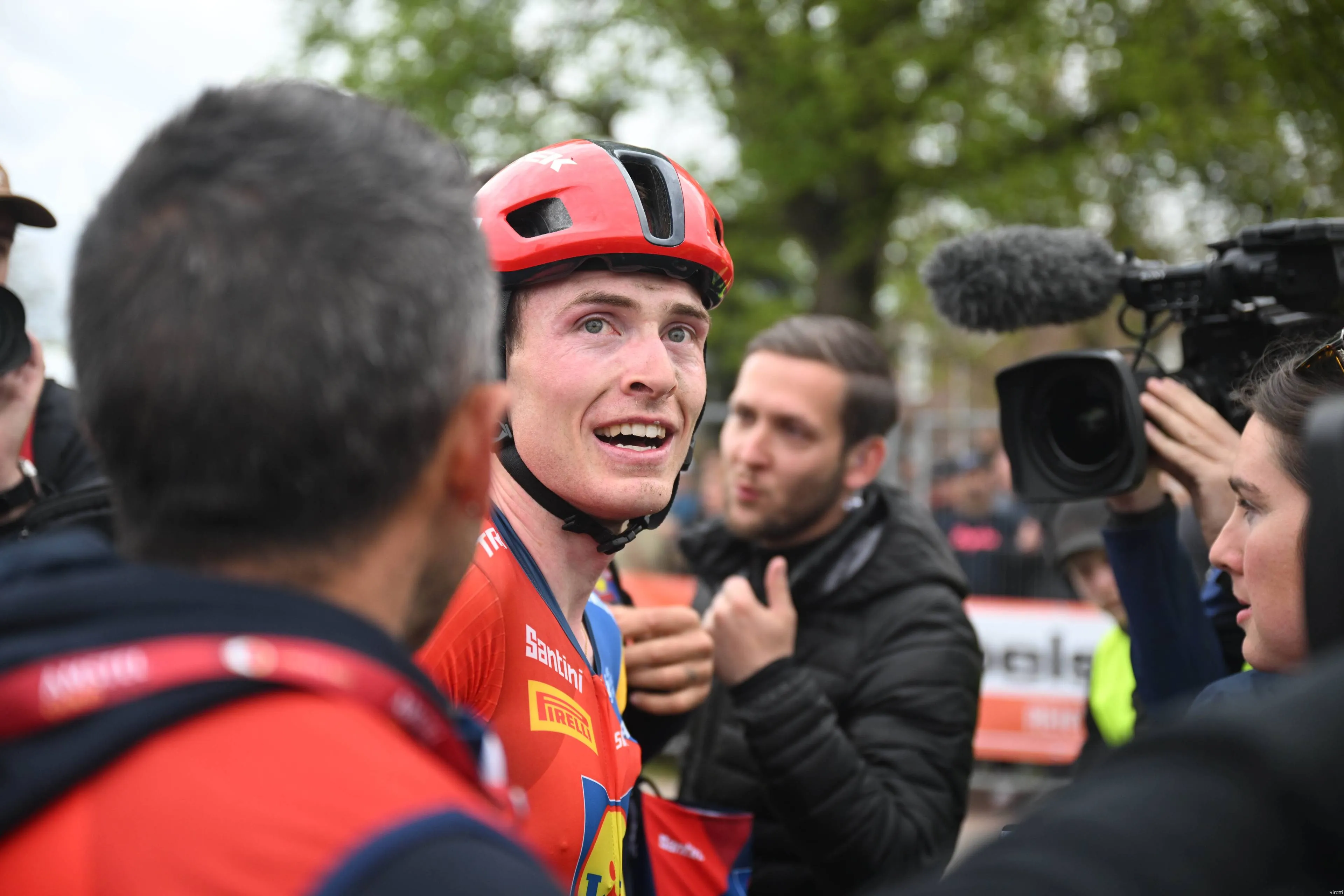
In a surprise twist, 24-year-old Dane Mattias Skjelmose from Lidl–Trek won the Amstel Gold Race on Sunday. With Tadej Pogacar and Remco Evenepoel at the start, a long, grueling race was expected. In a three-up sprint, it was Skjelmose who unexpectedly came out on top, just a month after suffering a hard crash on his head at Paris–Nice. “That crash in Paris–Nice was actually the best thing that could’ve happened for the Ardennes classics,” Skjelmose said surprisingly at the press conference.
Skjelmose’s strong focus on the Ardennes classics had already come to light during an interview at the Tour of the Basque Country. Despite being competitive at the front of that race, he surprised the interviewer by saying the Basque Country was not a major goal for him. No, the hillier classics were his true priority. At the press conference after his Amstel victory, he elaborated: “Yes, I’m in even better shape now than I was then,” said Skjelmose.
“Since my crash at Paris–Nice, I’ve gone through a rough patch. I didn’t even know if I’d be able to start in the Basque Country. But that crash ended up being the best thing that could’ve happened for the Ardennes classics. I went into the Basque Country at about 95 percent form, and those six super-tough stages were perfect to get that last 5%.”
Back at the highest level
Skjelmose’s victory in the Amstel Gold Race might be even more surprising than if it had happened last year. In 2023, he took second place in La Flèche Wallonne, but last year he seemed noticeably weaker. “After the 2023 season, I lost a lot of power,” he said.
“That year’s Tour de France really took its toll on me. I struggled to find my best legs again afterward. But this winter, we made a good adjustment. I spent a lot of time in the gym, and clearly that’s paying off now.”
Is it surprising that he, as a lighter rider, won the Amstel, traditionally the least suited to climbers out of the three Ardennes classics? “It’s definitely the one that suits me the least. But if the race is ridden at such a fast pace like it was today, it’s better for climbers. We also had a really strong team today. It was the first time I asked for a rider to stay with me all race. Otto Vergaerde did just that and was unbelievable today. He kept me in the right position, he almost helped me pee when I had to,” Skjelmose laughed.
“The team did everything perfectly, and that’s why I’m sitting here now.”
Read more below the photo!
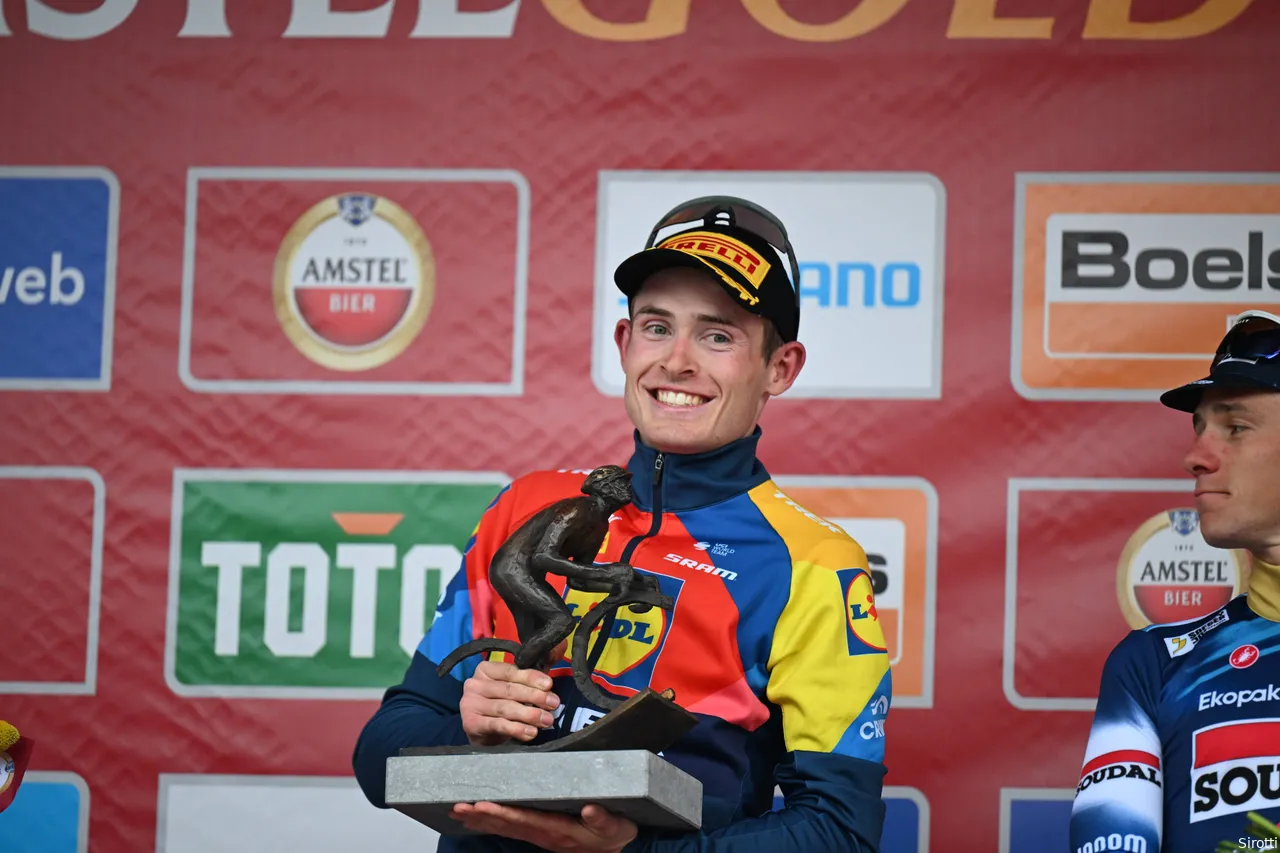
Evenepoel did 80 percent of the chasing work
As for the race itself: the major selection had already begun several kilometers before the finish, but with 45 km to go, Tadej Pogacar responded to an attack by Julian Alaphilippe. “It was really frustrating that I was blocked behind Ben Healy at that moment, because otherwise I could’ve gone with Tadej. Luckily, I managed to get back up there with Remco.”
On the Keutenberg, Skjelmose attacked from the small group behind Pogacar. He wasn’t closing the gap, until Evenepoel bridged up to him solo and rode fast enough to put Pogacar under pressure.
Did Skjelmose believe that he and Remco could actually catch Pogacar? “Not at all,” he said.
“When Tadej attacks, you usually ride for second place. So when I attacked on the Keutenberg, it was with that in mind. Once I got to Remco, I was on the limit. I told him that, and he believed me. I probably did 20 percent of the work behind Tadej, and he did 80 percent. On my own, I never could’ve caught Tadej. But the best possible rider to have with me was with me: Remco.” “On the climb after the penultimate time up the Cauberg, I started to believe. Remco did a few brutal turns on the front, I was suffering, but we caught Tadej.”
Did Skjelmose have a plan on the final climb of the Cauberg? “Not to get dropped,” the Dane laughed.
“I really had nothing left in my legs. I was just super happy to be in that group. Third place seemed like the best possible outcome. On the last time up the Cauberg, I went to the front to keep the pace up a bit and stay ahead. After that, I gave myself less than a 10 percent chance of winning the sprint. Of course, I always race for the best result, but since the penultimate time up the Cauberg, I was on my limit. I had no power left.” Yet Skjelmose managed to hang on and won the sprint in Berg en Terblijt, against all odds.
Read more below the photo!
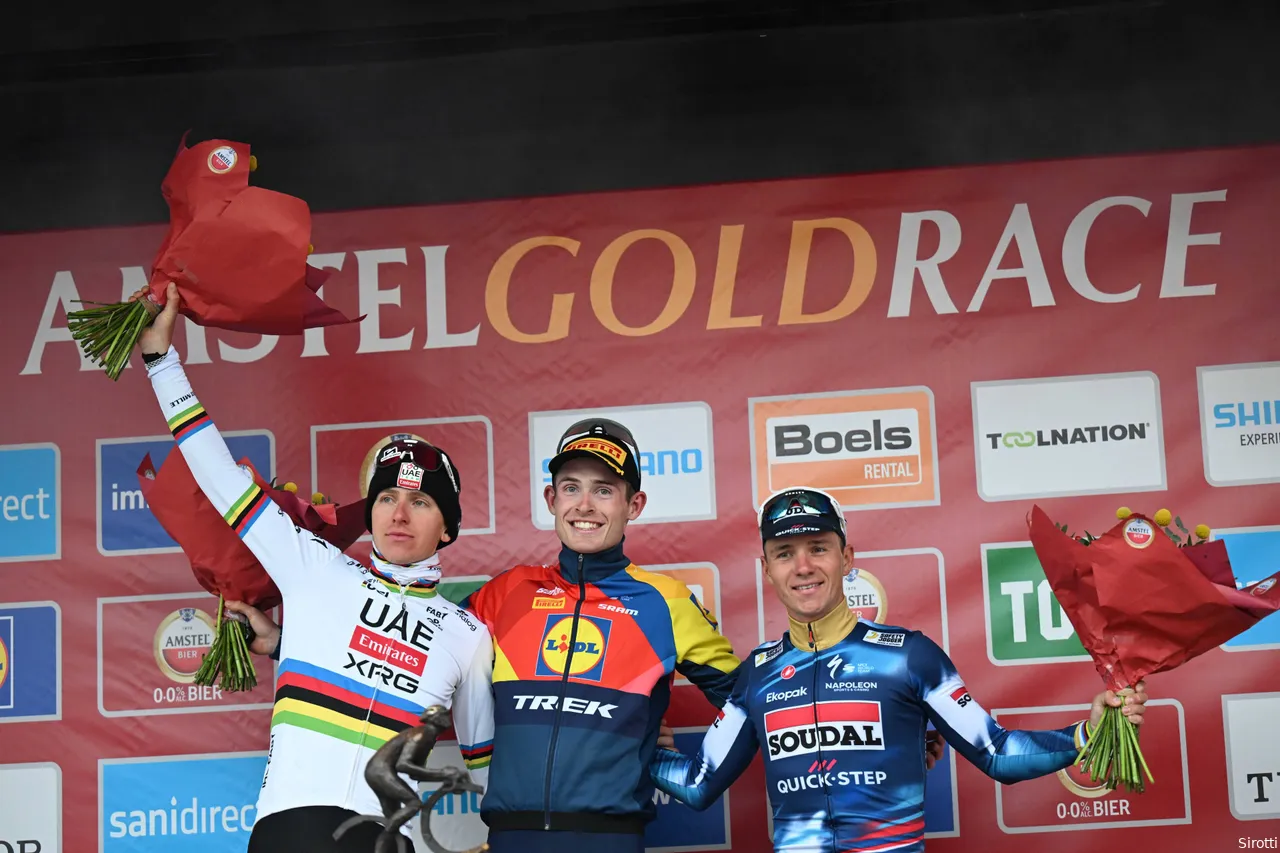
"If anyone can beat Tadej Pogacar on the mur de Huy, it's Thibau Nys"
Skjelmose finished second behind Pogacar in La Flèche Wallonne in 2023. Now, all eyes are on his Lidl–Trek teammate Thibau Nys, who has set his sights on Wednesday’s classic. But does Skjelmose’s Amstel Gold Race win change anything about team leadership heading into La Flèche? “Yes, I was second on the Mur de Huy two years ago. But I have to be realistic. I’ve said it before and I’ll say it again: if anyone can beat Tadej Pogacar on the Mur de Huy, it’s Thibau Nys. If he’s on a good day, he’s our guy. But when I was second to Tadej two years ago, Giulio Ciccone finished fifth. So it’s possible to play more than one card. We’re riding to win and Nys is the only rider in the peloton I can see potentially beating Tadej there.”
Read also
IDL-productions

Pogacar responds to Soudal complaints: "Domen Novak had already set the pace for 150 km"
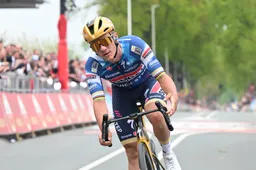
Evenepoel points to UAE rider as cause of massive crash, and warns ahead of Huy: "Nys won’t get a free ride"
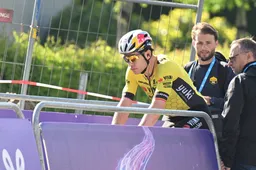
Van Aert admits mistake: "That was a misjudgment on my part"
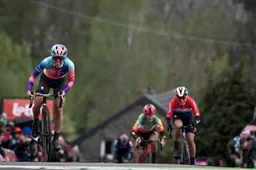
Preview La Flèche Wallonne 2025 - women | Vollering, Kopecky, Niewiadoma, and of course seven-time winner Van der Breggen!
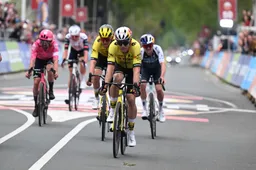
Visma | Lease a Bike dismisses Giro rumors about strong climbing van Aert as pure speculation
Latest Cycling News
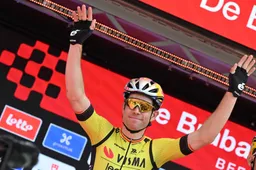
Former riders highlight key detail in Wout van Aert's spring classics: "Better than in 2021"
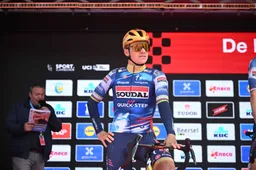
Evenepoel full of confidence after Amstel ahead of Flèche Wallonne, but Soudal Quick-Step remains wary of early UAE attacks

Ecstatic Ciccone outsprints AG2R duo to take victory in Tour of the Alps

Pogacar responds to Soudal complaints: "Domen Novak had already set the pace for 150 km"
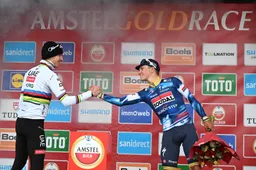
Is Evenepoel mentally ahead of Pogacar? "Evenepoel can literally win any one-day race"
Popular Cycling News
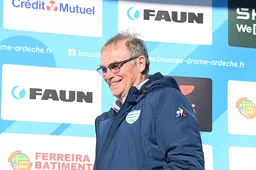
Hinault fires back at French critics over Pogačar doping suspicions: "What would they say if he were French?"

Pogacar responds to Soudal complaints: "Domen Novak had already set the pace for 150 km"

Evenepoel points to UAE rider as cause of massive crash, and warns ahead of Huy: "Nys won’t get a free ride"
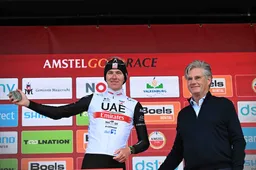
Preview Amstel Gold Race 2025 | Pogacar vs. van Aert, with Pidcock, Nys, Evenepoel & others in the mix

Van Aert admits mistake: "That was a misjudgment on my part"
Latest Comments
- Such negative comments that are truly inappropriate and actually ridiculous. He sounds like an old man, bitter that he can't race anymore. Why can't he just be gracious? Or just shut up. Instead of howling for attention, in such a rude manner. Must be Dementia creeping in. We are all living in the Now. Records are there, and some are being broken, some are unapproachable. If he doesn't like it, and it makes him sick, maybe he ought start watching some other sport. Don't want the old mans health to be upset.
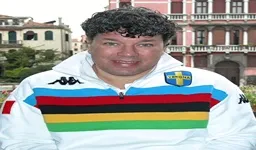 reemmo031-03-2025
reemmo031-03-2025 - Roger De Vlaeminck inspires me to create a new beer: "Bitter Old Twat Belgian".JackInhof31-03-2025
- Shoot, I'll ride it for 1/10 of what his pay for that day is😅Veganpotter30-03-2025
- What is this? The Lance Armstrong daily cheaters channel? I could care less about Johan and Lance the seven times cheater. Greg Lemond was right all along, Why don't you write about that instead of these two knuckleheads.velodrone28-03-2025
- Are we all doomed to hear from Lance Armstrong and Johan bruneel until the end of time? It's not enough the stain they left on cycling? Do we have to see that shadow forever?bigyakman26-03-2025
- I am not sure if it is the hardest to win. In Flanders and Roubaix well before the finish the Peleton will be decimated and the race will normally be won by the best rider of the day or maybe 2nd or 3rd in case of a mechanical or unlucky break especially in case of Roubaix. In San Remo just before the finish there will still be several riders in contention and they are hard to ditch. For the best riders it is a race hard to win since it is not so selective. But if you are not a top 5 rider but still a top 10 rider this race is your best change to win. You will see more Milan San remo Winners with only 1 monument win than any other monumentsJoostmehrtens19-03-2025
- "fap fap fap oh Lance oh oh OHHHHHHH" again. Does he pay you to dredge up people with nice things to say about him? He was an giant a$$hole to people. It is a fact. Whatever his contrition about the doping, he is unapologetic about being a giant a$$hole to people. (Why yes, I do only login to complain. *I* am however only a giant a$$hole to people who laud giant a$$holes.)ericjensenridesbikes25-02-2025
- Remco is still very young. And injuries can absolutely keep you from overdoing it and getting worse. The recent Remco accident didn't keep him from being able to ride a recumbent inside. Wout's knee is a different story thoughVeganpotter23-01-2025
- Van der Poel style is winning by a half a lap and leading the race from the end of the second lap.
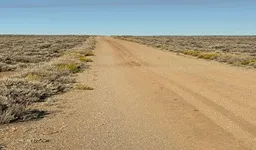 Barnes127420-01-2025
Barnes127420-01-2025 - If she thinks talent alone will put her there she will not see many podium finishes much less a GC finish.....work as a team utilizing tactics to consistently be at the top.Germanrazor10-01-2025


